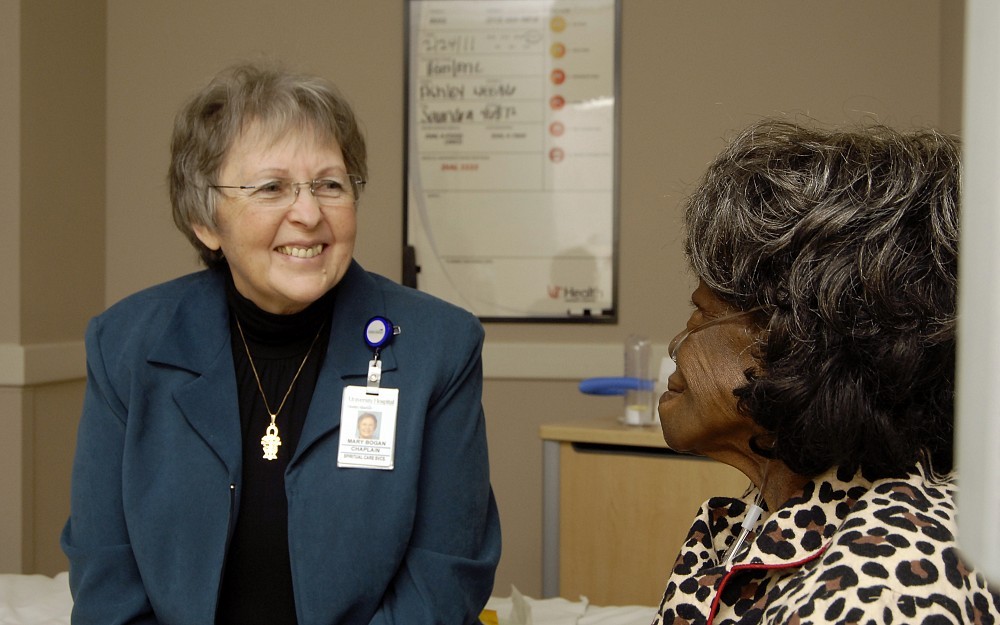
Federal Grant Funds Palliative Care Initiatives, Community Outreach
CINCINNATIThe department of family and community medicine at the University of Cincinnati will create new educational programs and community outreach related to palliative medicine with the help of a grant from the federal Health Resources and Services Administration (HRSA).
HRSA, an agency of the U.S. Department of Health and Human Services, is the primary federal agency for improving access to health care services for people who are uninsured, isolated or medically vulnerable. The agency also supports improvements in primary care education at academic medical centers throughout the U.S.
This project, totaling $700,000 over the next five years, will include the creation of programs within the department to strengthen faculty expertise and skills in palliative medicine, develop curriculum for a new hospice and palliative medicine fellowship program and create new learning opportunities in palliative medicine for primary care residents.
Palliative medicine is a medical specialty focused on improving the quality of life of people facing chronic, life-threatening illness. Emphasis is placed on pain and symptom management as well as communication and coordination of care.
"We are very excited about this opportunity, both for our department and for our community, says Doug Smucker, MD, an adjunct professor in the department and a board-certified specialist in hospice and palliative care who will be leading the project. "Americans are living longer and must often cope with the medical, social and emotional burdens of serious chronic disease in the final stages of life.
"Building a network of clinicians and teachers skilled in palliative care, particularly for vulnerable older patients, is essential in meeting the demand for care of this growing population of patients. The creation of this specialized training is a step in the right direction.
Smucker says the first stage of the project will involve expanding faculty expertise in palliative medicine by creating a Palliative Medicine Faculty Scholars Group that will review and catalogue national teaching resources, complete faculty development programs leading to board certification and outline curriculum plans for the first hospice and palliative medicine fellowship training program in the region. The group will also integrate new palliative medicine teaching programs into all UC family medicine hospital rotations for primary care residents and inter-professional care teams.
In addition, the project will include educational outreach to the community by creating palliative care educational programs at Maple Knoll Village, a retirement community in Springdale, and strengthening a partnership among the department, the Respecting Choices program of La Crosse, Wis., and the Health Collaborative in Cincinnati to improve advance care planning services for seniors in the community.
"I am particularly excited to be able to build on current pilot projects with the Health Collaborative, Smucker says. "We want to do a better job of honoring patients wishes for the care they want to receiveespecially near the end of life.
He adds that a grant from the Helen Steiner Rice Fund of the Greater Cincinnati Foundation and donations to the Health Collaborative from a number of local health care organizations supported pilot work on advance care planning in 2011 and formed the basis for the community outreach objective in the new HRSA-funded project.
"It is a great example of how generous local support for smaller projects can open doors to a wider community effort, Smucker says.
"This funding is providing an opportunity to really make a difference in palliative care in our community and to provide the proper training and support for physicianspresent and future.

Doug Smucker, MD
Tags
Related Stories
Yahoo News: Doctors see rising rates of colon cancer in younger...
May 1, 2024
Yahoo News featured comments from the University of Cincinnati's Rekha Chaudhary in a story about rising rates of diagnoses and deaths from colorectal cancers among young people.
Neuroimaging, AI help detect brain changes
May 1, 2024
Researchers at the University of Cincinnati and Dell Medical School at the University of Texas at Austin are leading a study using state-of-the-art neuroimaging techniques and artificial intelligence to identify changes in the brains among children of adults living with bipolar disorder.
From flight nurse aspirations to health care innovation: Meet...
April 30, 2024
We can thank flight nurses to Bachelor of Science in Nursing, Class of ’97 alumnus Nick Dobrzelecki’s interest in nursing. More than 30 years since making that decision, Dobrzelecki has not yet flown as a nurse, but has impacted the health care industry on many fronts.
